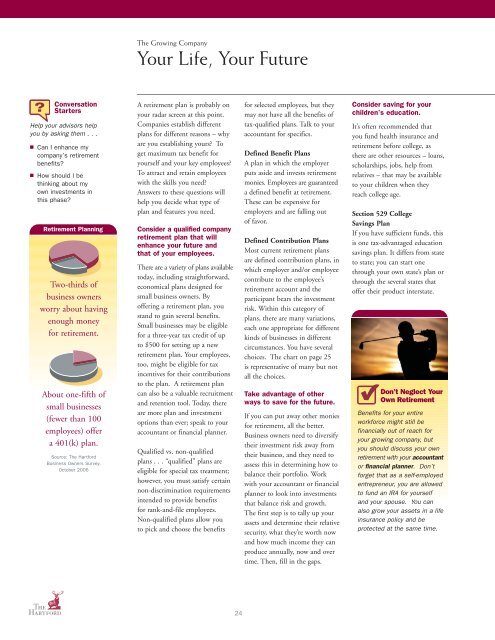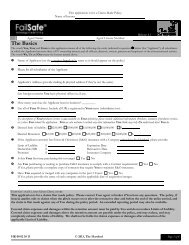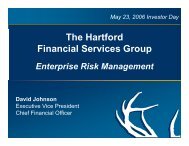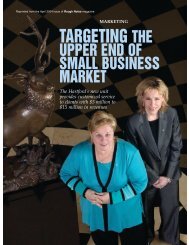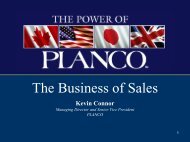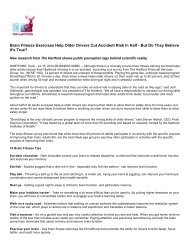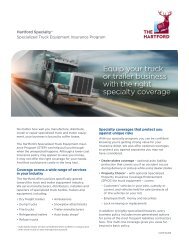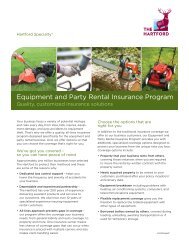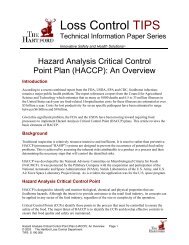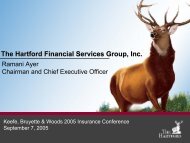Business Owner's Playbook - The Hartford
Business Owner's Playbook - The Hartford
Business Owner's Playbook - The Hartford
Create successful ePaper yourself
Turn your PDF publications into a flip-book with our unique Google optimized e-Paper software.
<strong>The</strong> Growing CompanyYour Life, Your FutureConversationStartersHelp your advisors helpyou by asking them . . .■ Can I enhance mycompany’s retirementbenefits?■ How should I bethinking about myown investments inthis phase?Retirement PlanningTwo-thirds ofbusiness ownersworry about havingenough moneyfor retirement.About one-fifth ofsmall businesses(fewer than 100employees) offera 401(k) plan.Source: <strong>The</strong> <strong>Hartford</strong><strong>Business</strong> Owners Survey,October 2006A retirement plan is probably onyour radar screen at this point.Companies establish differentplans for different reasons – whyare you establishing yours? Toget maximum tax benefit foryourself and your key employees?To attract and retain employeeswith the skills you need?Answers to these questions willhelp you decide what type ofplan and features you need.Consider a qualified companyretirement plan that willenhance your future andthat of your employees.<strong>The</strong>re are a variety of plans availabletoday, including straightforward,economical plans designed forsmall business owners. Byoffering a retirement plan, youstand to gain several benefits.Small businesses may be eligiblefor a three-year tax credit of upto $500 for setting up a newretirement plan. Your employees,too, might be eligible for taxincentives for their contributionsto the plan. A retirement plancan also be a valuable recruitmentand retention tool. Today, thereare more plan and investmentoptions than ever; speak to youraccountant or financial planner.Qualified vs. non-qualifiedplans . . . “qualified” plans areeligible for special tax treatment;however, you must satisfy certainnon-discrimination requirementsintended to provide benefitsfor rank-and-file employees.Non-qualified plans allow youto pick and choose the benefitsfor selected employees, but theymay not have all the benefits oftax-qualified plans. Talk to youraccountant for specifics.Defined Benefit PlansA plan in which the employerputs aside and invests retirementmonies. Employees are guaranteeda defined benefit at retirement.<strong>The</strong>se can be expensive foremployers and are falling outof favor.Defined Contribution PlansMost current retirement plansare defined contribution plans, inwhich employer and/or employeecontribute to the employee’sretirement account and theparticipant bears the investmentrisk. Within this category ofplans, there are many variations,each one appropriate for differentkinds of businesses in differentcircumstances. You have severalchoices. <strong>The</strong> chart on page 25is representative of many but notall the choices.Take advantage of otherways to save for the future.If you can put away other moniesfor retirement, all the better.<strong>Business</strong> owners need to diversifytheir investment risk away fromtheir business, and they need toassess this in determining how tobalance their portfolio. Workwith your accountant or financialplanner to look into investmentsthat balance risk and growth.<strong>The</strong> first step is to tally up yourassets and determine their relativesecurity, what they’re worth nowand how much income they canproduce annually, now and overtime. <strong>The</strong>n, fill in the gaps.Consider saving for yourchildren’s education.It’s often recommended thatyou fund health insurance andretirement before college, asthere are other resources – loans,scholarships, jobs, help fromrelatives – that may be availableto your children when theyreach college age.Section 529 CollegeSavings PlanIf you have sufficient funds, thisis one tax-advantaged educationsavings plan. It differs from stateto state; you can start onethrough your own state’s plan orthrough the several states thatoffer their product interstate.Don’t Neglect YourOwn RetirementBenefits for your entireworkforce might still befinancially out of reach foryour growing company, butyou should discuss your ownretirement with your accountantor financial planner. Don’tforget that as a self-employedentrepreneur, you are allowedto fund an IRA for yourselfand your spouse. You canalso grow your assets in a lifeinsurance policy and beprotected at the same time.24


